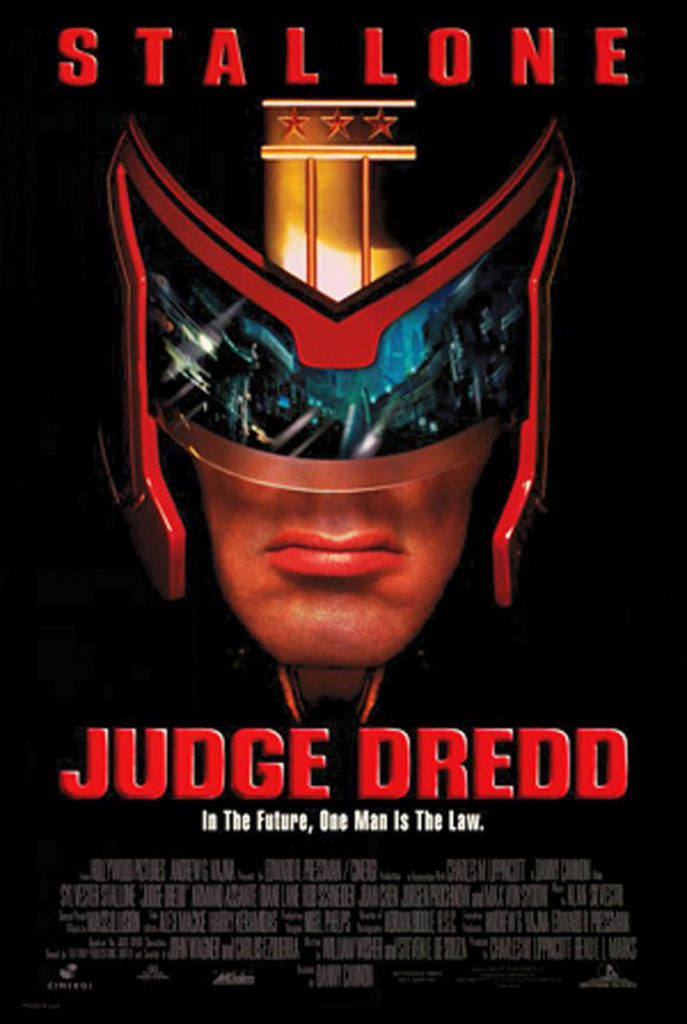Judge Dredd, the comic sprung from the minds of writers John Wagner and Alan Grant, has perhaps the most fully realized fictional universe in all of human storytelling. Every week since the late 1970s, with only a single exception, an issue of 2000 AD has been published with a Judge Dredd story inside. Since that time, the titular Judge Dredd and supporting characters have aged along with the rest of us, and the universe has retained the same continuity. Meanwhile, Judge Dredd’s superhero competitors retcon their universes ever time their sales need a punch up. DC recently carried out its 2nd reboot in five years.
Imagine if human history worked like that. Every time things got too complicated and outlandish (like now, for instance), the people in charge could get together to roll it back and start fresh. That sure would be nice after all we’ve seen lately. I mean, President Trump? You know a universe needs a retcon when that’s the best the writers can come up with.
Anyway, my point is that I can’t think of any fictional universe with so much history for a film to draw from, and that includes The Lord of the Rings. With so much lore, and with so many references to it in the film, I can’t imagine how the people responsible for 1995’s Judge Dredd thought it was okay for Dredd to take off his fucking helmet.
From director Danny Cannon and screenwriters William Wisher, Jr. and Steven E. de Souza, Judge Dredd splits its time between being an adaptation of the source material and a vehicle for its star, Sylvester Stallone. This is a problem. As realized as the universe of the Judge Dredd comics is, it is not the universe alone that makes the comics  so successful — it’s also the very strong lead character. Dredd is a colossal presence in the comics. He’s imposing in both stature and importance. In order for a Judge Dredd adaptation to work, the character cannot be sublimated to a Hollywood star. At the same time, it’s unreasonable to force filmmakers to sublimate their hot property to a fictional character. Therefore, it was a mistake to cast Stallone as Dredd, as perfect as he seemed for the role at the time.
so successful — it’s also the very strong lead character. Dredd is a colossal presence in the comics. He’s imposing in both stature and importance. In order for a Judge Dredd adaptation to work, the character cannot be sublimated to a Hollywood star. At the same time, it’s unreasonable to force filmmakers to sublimate their hot property to a fictional character. Therefore, it was a mistake to cast Stallone as Dredd, as perfect as he seemed for the role at the time.
Judge Dredd also suffers from being a little too polished. All one has to do to understand what that means is look at the sets of Mega-City One. It’s supposed to be a dangerous, dirty, and gritty city. But it’s all so obviously decoration. It never feels like a real place. The criminals who inhabit it never feel like real bad guys. The future vehicles have all the originality of gluing doodads on used sports cars. George Lucas was an advocate for showing wear and tear in sci-fi films, as a means of aiding suspension of disbelief. He used the idea to effect in THX 1138 and the original Star Wars trilogy. Cannon and company gave it the old college try, but there isn’t a single scene in Judge Dredd that looks like a real place.
But the lore!
For a film that clocks in at a modest 96 minutes, there is a whole lot of the Judge Dredd universe packed in. This sounds like a good thing, at first, but it’s another miss on the part of the filmmakers. Including the Angel family, some of the most significant and enduring Judge Dredd characters, felt like filler and a cheap attempt at fan service. It would be much better to keep characters like that in reserve instead of breaking up the film’s focus on its main plot. As for that plot? It’s a story of consequence, not just an everyday tale from the pages of Judge Dredd.
The evil Judge Griffin (Jürgen Prochnow) has a scheme to oust the elderly Chief Justice Fargo (Max von Sydow) from his chair, and take over Mega-City One. But in order to do that, first he needs to get the city’s most-dogged and relentless judge, Dredd, out of the way. After ensuring Dredd’s brother, Rico (Armand Assante), escapes from prison and returns to the city, the next order of business is framing Dredd for murder, convincing Fargo to resign, and killing a whole lot of people.
That makes this film a rather straightforward tale of good guys versus bad guys. How that’s done is what makes the movie good or bad. As a Judge Dredd story, the film is flawed. But not fatally so. Despite the failings of casting and setting (and some pretty stupid-looking shoulder pads), Judge Dredd is an adventure, even with Rob Schneider gobbling up way too much screen time. There is no depth to this film whatsoever, and it lacks both the absurdity of the source material, and the heaviness that made 2012’s Dredd work so well. Its reputation as a poor Judge Dredd adaptation is overblown, albeit only slightly. If one knows nothing about the comics, or can pretend they don’t exist, it’s not a bad flick.
